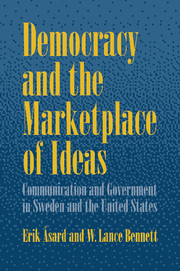Preface
Published online by Cambridge University Press: 12 October 2018
Summary
How do citizens and leaders in democratic nations communicate about their problems and prospects for the future? What can be learned from other nations about how to communicate in more effective and satisfying ways? These are important questions in an age of instant electronic communication in which the populations of the world's industrial democracies are wired for all manner of input. T h e irony, or perhaps the result, of communication in this Digital Age is that the quality of political ideas in many nations has deteriorated into simplistic sloganeering and angry rhetoric with little perceptible improvement in the human political condition. This book explores the institutional links between society and government that shape political communication. These regulators of national communication include parties and electoral representation systems, interest group processes, campaign finance mechanisms, and the media - factors that are familiar to anyone who follows politics, yet that may not be recognized for their combined effects on the quality of political discourse. We propose to explore how these core elements of political systems affect the ways in which people communicate and how effective that communication is at defining public problems and identifying workable solutions.
Our main argument is that fundamental changes have occurred in the way that most democratic nations conduct their public discourse - how publics and leaders, in effect, define themselves in the contemporary world. T h e link between rhetoric and the workings (and breakdowns) of government has never been more apparent. We are witnessing rebellious voters and renegade candidates the world over taking often misguided aim at institutions of power. We take a more systematic look at how institutions forged in earlier eras may limit the terms of national debate. At the same time, it is clear that not all nations face the same institutional limitations, making the study of national differences as important as the concern about common trends. The political marketplace in many Western democracies has been transformed from being a forum for heated debate and a comparatively lively exchange of ideas into one dominated by only a few substantive issues and a lot of quite streamlined rhetoric that is more likely to be the product of political marketing research than of inspired leadership.
- Type
- Chapter
- Information
- Democracy and the Marketplace of IdeasCommunication and Government in Sweden and the United States, pp. vii - xviPublisher: Cambridge University PressPrint publication year: 1997



